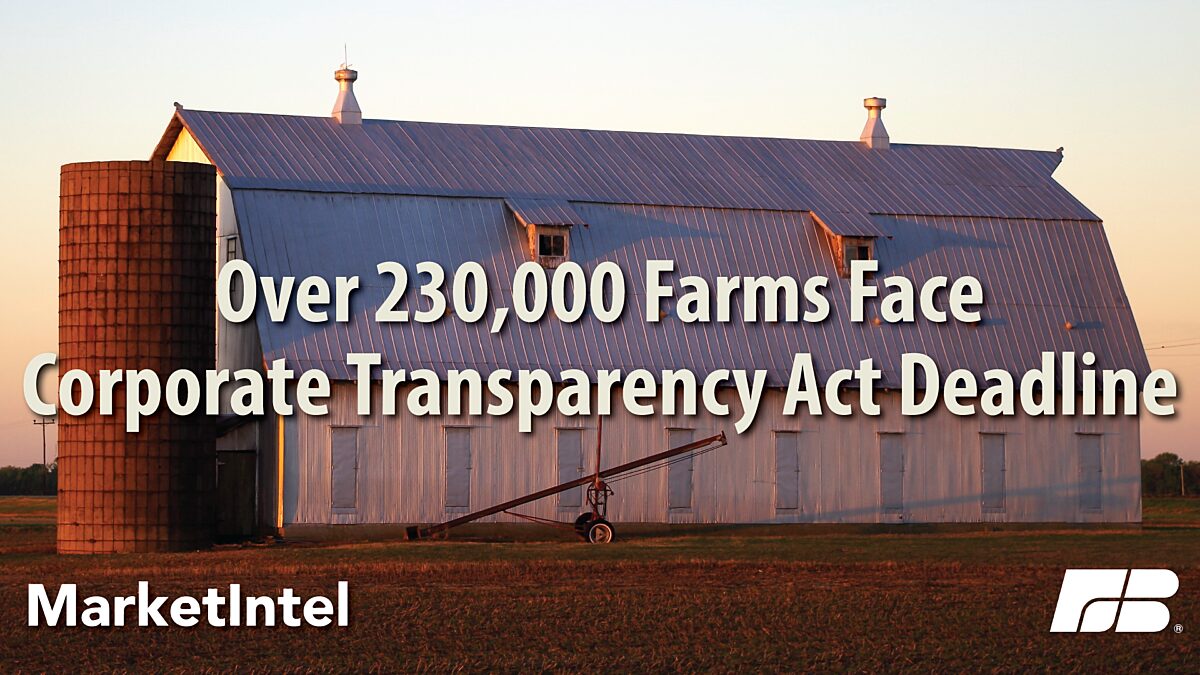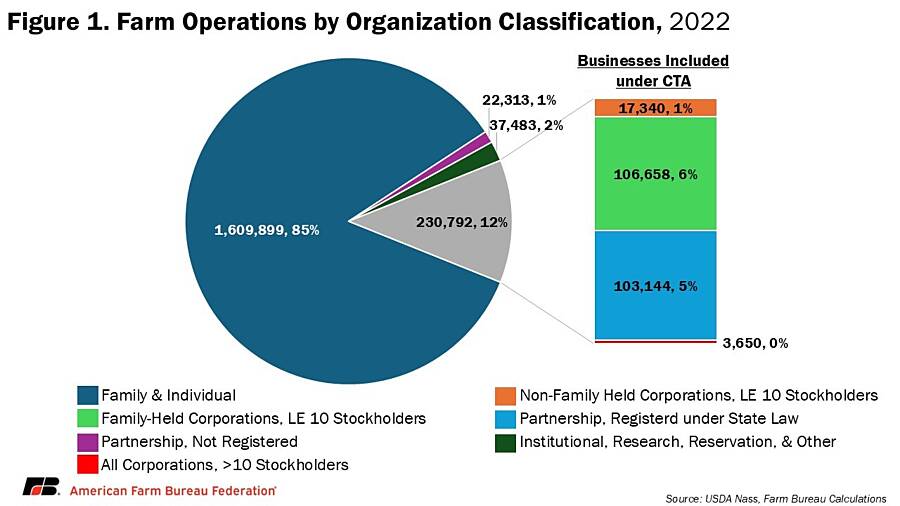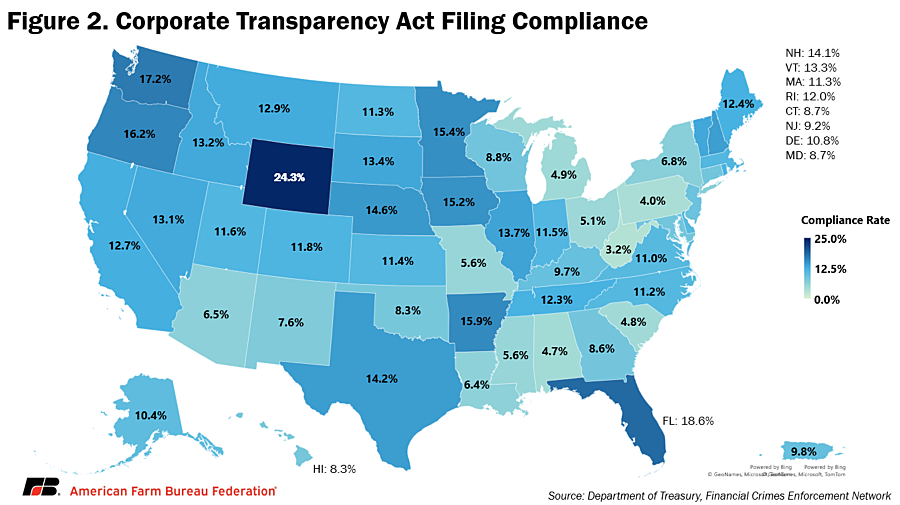Corporate Transparency Act Deadline Looming
TOPICS
Transparency Act
Samantha Ayoub
Associate Economist
As of Thursday, December 26, 2024, the United States Court of Appeals for the Fifth Circuit reinstated an injunction halting the required filing of Beneficial Ownership Information (BOI) for every small business subject to the Corporate Transparency Act (CTA). The American Farm Bureau Federation encourages all farmers, ranchers and business owners who would fall under the filing requirements to continue to gather the necessary information and be prepared to file, if required to do so in the future. Detailed information available at: Beneficial Ownership Information Reporting | FinCEN.gov
Over 230,000 farms are up against a Jan. 1, 2025, deadline to file their detailed Beneficial Ownership Information (BOI) with the Treasury Department under the requirements of the Corporate Transparency Act (CTA). Despite facing steep fines and possible jail time for failing to file, less than 11% of eligible businesses nationwide have filed their BOI. Efforts to protect small businesses from these invasive requirements and the harsh punishment for noncompliance have stalled in Congress. Let’s review what the Corporate Transparency Act means for farmers.
What is the Corporate Transparency Act?
The Corporate Transparency Act was passed in 2021 to combat money laundering and organized crime funding. The CTA requires that registered businesses register any “beneficial owner” of the company with the U.S. Department of Treasury’s Financial Crimes Enforcement Network (FinCEN). The BOI filing requirement applies to any small business that files an incorporating document with their state business authority to conduct business in the United States, including corporations, limited partnerships or limited liability companies (LLCs). The FinCEN classification of a “small entity” is having less than 20 employees and under $5 million in cash receipts.
While the actual structure of a business – and the process to incorporate – can vary slightly state to state, most farms operate as pass-through entities in which the company’s income is passed directly into the owner’s individual income, rather than being taxed as business revenue. When a business files an incorporating document, it is classified as a C-corporation (C-corp) or S-corporation (S-corp). When a business files an organizing document, it is generally classified as an LLC. C-corps are legally separated from their owners and are taxed at both a business and individual level. S-corps, partnerships and LLCs pass business revenue through to be taxed at the owner level, but they provide liability protection to their owners by operating as independent entities.
Beneficial owners include anyone with a significant stake in the company, whether or not they have direct legal ties to the business. This may include holding at least 25% of a company’s shares, having a similar level of control over the company’s equity or holding significant influence over the company’s decisions and operations (i.e., the authority to exercise substantial managerial control over the reporting company). Should a business partake in illegal activities, each such stakeholder is accountable for the crimes of the business.
Filings must include all personal information like addresses, birthdays and identification numbers for each owner. While this report does not have to be renewed after the initial filing, changes of address, new driver’s licenses or changes of name all require updated filings. Since having control over a business’ operations qualifies as beneficial ownership, a restructuring of job duties, even if the person does not have a legal ownership stake in the company, could also trigger requirements to file updates.
Liable Agricultural Firms
The vast majority of farms and ranches operate as sole proprietorships (Family & Individual in Figure 1) and are likely exempt from filing their BOI, but 230,792 farming operations are state-registered businesses, either as corporations or partnerships, according to the 2022 Census of Agriculture. These 12% of all farm operations operate 33% of farm acres.
Even though these farms may be legally classified as corporations, they are still small family firms. While the vast majority of farms are pass through entities, 85% of farm businesses formed as c-corps are family-owned and fall well under the employee and revenue cap set by the CTA.
Farms and ranches aren’t the only agricultural businesses that have to meet CTA requirements. Many feed and supply stores, crop marketers like grain elevators and the greater rural business community are also likely required to file their BOI and subject to penalties if they do not. The regulatory burdens and potential enforcement crackdowns could have ripple effects throughout the entire food, fiber and fuel supply chains.
Filing Delays
With just three months left to register, only 11% of the estimated 30 million companies that fall under the filing requirements of Jan. 1, 2025, have successfully filed with FinCEN.
Businesses that fail to file, or do not update records when needed, could face criminal fines up to $10,000 and additional civil penalties of up to $591 per day they fail to file. If the hefty fines are not deterrence enough, failure to file could also lead to felony charges and up to two years in prison, whether or not these paperwork violations are linked to any other crime. Since these criminal risks also apply to record updating, tracking these CTA requirements could be a grey cloud for small business owners well beyond Jan. 1.
Corporate Transparency Act Speedbumps
A lack of awareness and other permitting and filing requirements are likely the biggest reason farms and other businesses fail to meet the CTA obligations. Businesses already file registrations with state agencies to operate, leading many to believe their information is recorded with the correct agencies, but FinCEN does not receive ownership information from these agencies. Many financial institutions require their own BOI reports from customers to absolve themselves of responsibility for fraudulent transactions. However, these do not fulfill the new CTA requirements as they are not reported to FinCEN.
CTA filing deadlines also vary depending on business inception. Jan. 1, 2025, is the deadline for businesses established before Jan. 1, 2024. If businesses were registered in the 2024 calendar year, they only had 90 days to file their BOI upon notification of their business certification. Businesses established after Jan. 1, 2025, will have even stricter filing requirements; they will only have 30 days after notification of their formation to submit their initial BOI report to FinCEN. This 30-day window also applies to updates to previously filed information for all registered businesses, adding another chore for small business owners (or those exercising “substantial control”) going through business restructuring, or major life changes, such as a family death or divorce.
While BOI is free to file, business owners should consult attorneys or accountants to determine whether or not they are required to file and, if so, when to ensure they comply with FinCEN’s standards. This adds another financial burden for farmers already facing significant cash flow problems during a tough year. However, professional advice may be helpful if you run into problems attempting to file.
Conclusion
Small businesses often lack the time and the staff to track ever-changing rules and regulations pushed out by the federal government. The Corporate Transparency Act is an added burden for small business owners nationwide, including farmers and ranchers. With unclear guidance and a lack of public awareness, businesses of all sizes are struggling to comply with new BOI requirements and are quickly approaching a deadline that bears criminal consequences.
There have been unsuccessful attempts to extend the filing period for small businesses, but Congress has a long laundry list of other legislation to pass before the end of the year, including a much-needed modernized farm bill and disaster relief. For now, business owners should anticipate a crackdown on CTA filings starting Jan. 1 and take steps to ensure they are in compliance.
See the Treasury Department’s BOI filing page at https://www.fincen.gov/boi.
Trending Topics
VIEW ALL

